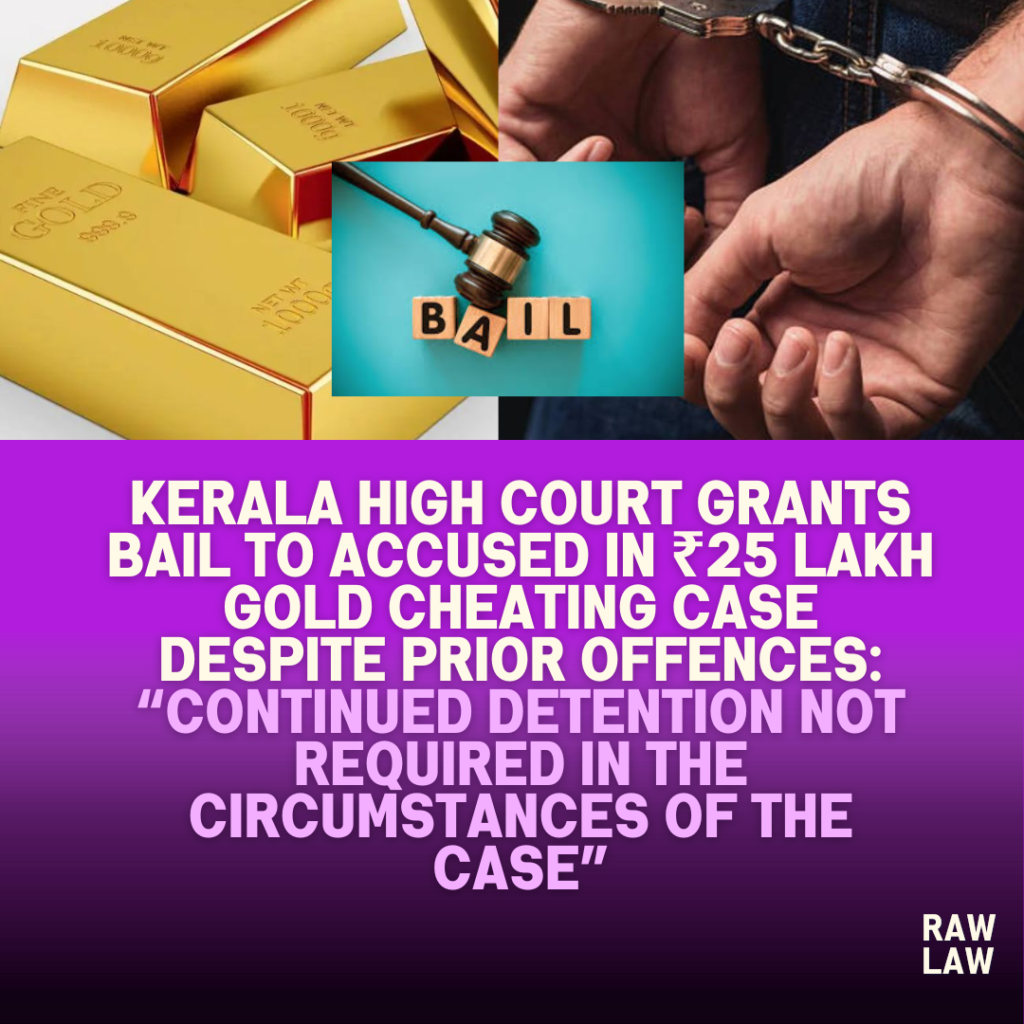Court’s Decision
The Kerala High Court granted bail to the petitioner, the second accused in a cheating case involving alleged misappropriation of 80 sovereigns of gold, observing that, “continued detention is not required in the circumstances of the case.” Despite the petitioner being involved in five other crimes, the Court found that the custody already undergone since May 2, 2025, warranted release on bail under stringent conditions. The Court imposed conditions to prevent tampering with evidence, influence on witnesses, or repetition of similar offences.
Facts
The case originates from a complaint filed against the petitioner and co-accused for allegedly inducing the de facto complainant to believe they could help retrieve her pledged gold ornaments from various banks. The complainant released approximately 80 sovereigns of gold based on this assurance. However, instead of returning the ornaments, the accused allegedly took away the gold for themselves, leading to registration of Crime No. 499 of 2024 at Alathur Police Station, Palakkad, under Section 420 read with Section 34 of the Indian Penal Code.
The petitioner was arrested on May 2, 2025, and remained in custody. Previous bail applications had been rejected.
Issues
- Whether the petitioner is entitled to bail under Section 483 of the Bharatiya Nagarik Suraksha Sanhita, 2023.
- Whether the petitioner’s continued detention is necessary, considering he is accused in other similar offences.
Petitioner’s Arguments
The petitioner, through counsel, argued that the allegations were false and that the complaint arose from a personal vendetta. It was contended that he had been in custody for nearly two months and that custodial interrogation was no longer required. Further, the petitioner pointed to previous High Court bail orders (Annexures A6 and A7) in unrelated matters, which were decided in his favour, highlighting his compliance with past bail conditions.
Respondent’s Arguments
The State vehemently opposed the bail application. The Public Prosecutor highlighted the gravity of the alleged cheating and emphasized that the petitioner was involved in five other criminal cases. It was argued that granting bail could lead to repetition of similar offences and might hamper the ongoing investigation.
Analysis of the Law
The Court analysed the offence under Section 420 read with Section 34 of the Indian Penal Code, dealing with cheating and common intention. The bail plea was adjudicated under Section 483 of the Bharatiya Nagarik Suraksha Sanhita, 2023. The Court noted that while the nature of the allegations was serious and the petitioner had multiple pending cases, bail could still be considered due to the time already spent in custody.
Precedent Analysis
The Court did not explicitly cite precedents in its reasoning but noted the earlier orders produced by the petitioner in Annexures A6 and A7—previous bail orders passed by the Kerala High Court in unrelated cases. The production of these orders signaled the Court’s recognition of consistent bail compliance in the petitioner’s legal history.
Court’s Reasoning
The Court acknowledged the seriousness of the allegations and the fact that the petitioner was a habitual offender. However, it emphasized the following:
“Considering the period of detention already undergone by the petitioner, I am of the view that the continued detention is not required in the circumstances of the case.”
This formed the crux of the reasoning. The Court held that appropriate conditions could be imposed to safeguard the investigation while balancing the rights of the accused.
Conclusion
The Kerala High Court allowed the bail application, releasing the petitioner on a bond of ₹50,000 with two solvent sureties. It imposed several conditions:
- The petitioner must cooperate with the investigation.
- He must not influence witnesses or tamper with evidence.
- He shall not commit similar offences.
- He cannot leave India without court permission.
The Court clarified that the jurisdictional court could modify or delete any condition as necessary.
Implications
This order reaffirms the principle that pre-trial detention should not become punitive, particularly when prolonged custody is no longer necessary for investigation. It also highlights the importance of balancing prosecutorial concerns with the rights of the accused to liberty. However, the Court’s caution in imposing multiple conditions reflects a strong awareness of the petitioner’s criminal history.
Cases Referred
- Annexure A6 – Bail Order dated 12.03.2025
The Court had previously granted bail to the petitioner in B.A. No. 8861 of 2024. - Annexure A7 – Bail Order dated 17.10.2024
Another prior bail order showing the petitioner’s history of securing bail and compliance.
These were cited to demonstrate that the petitioner, when granted bail earlier, adhered to conditions and did not misuse liberty.
FAQs
1. Can an accused be granted bail despite having multiple prior cases pending?
Yes, the court may still grant bail if it finds that continued detention is unnecessary and the accused can be released under conditions that ensure justice.
2. What are the typical conditions imposed during bail in cheating cases?
Conditions often include appearance before the investigating officer, prohibition from contacting witnesses, restrictions on travel, and a requirement not to commit similar offences.
3. What does Section 483 of the Bharatiya Nagarik Suraksha Sanhita provide for?
It allows the High Court to exercise its powers to grant bail, similar to Section 439 of the erstwhile Criminal Procedure Code, particularly in non-bailable offences.



